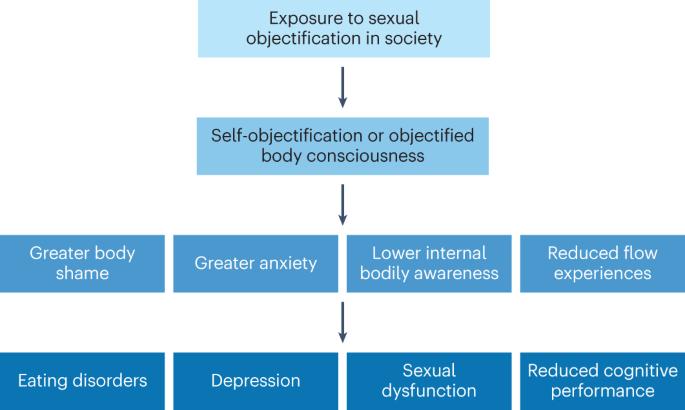The sources and consequences of sexual objectification
IF 16.8
Q1 PSYCHOLOGY, MULTIDISCIPLINARY
引用次数: 2
Abstract
Sexual objectification (treating a person as a body or collection of body parts) involves a cultural prioritizing of women’s sexual appearance and appeal over other attributes. Sexual objectification is prevalent, permeates many aspects of women’s lives, shapes general assumptions about women and exacts many consequences on women and society. In this Review, we synthesize empirical evidence about the sources and consequences of seeing women as sexual objects, and of women’s objectification of themselves (self-objectification). In general, sexually objectified women are perceived more negatively, and as less competent and less fully human than women who are not sexually objectified. Exposure to this cultural messaging has broad consequences and fuels sexist attitudes and violence towards women. A central consequence for women is self-objectification, which is associated with a more negative body image; diminished mental, physical and sexual health; and impaired cognitive performance. Sociocontextual factors influence women’s experiences with sexual objectification, and here we explore the role of race and ethnicity, in particular. We conclude with suggested directions for future research. Sexual objectification refers to a cultural prioritization of sexual appearance and appeal over other attributes. In this Review, Ward et al. synthesize empirical evidence about the sources and consequences of seeing women as sexual objects, and of women’s objectification of themselves (self-objectification).

性客体化的来源和后果
性物化(将人视为躯体或躯体部分的集合体)涉及一种将妇女的性外表和性吸引力置于其他属性之上的文化。性物化现象十分普遍,渗透到女性生活的许多方面,形成了对女性的普遍假设,并对女性和社会造成了许多影响。在这篇综述中,我们综合了有关将女性视为性玩物以及女性物化自身(自我物化)的来源和后果的经验证据。一般来说,与未被性物化的女性相比,被性物化的女性被视为更消极、更无能、更不完整的人。接触这种文化信息会产生广泛的后果,助长对妇女的性别歧视态度和暴力行为。女性的一个主要后果是自我物化,这与更消极的身体形象、心理、生理和性健康的减弱以及认知能力的受损有关。社会背景因素影响着女性的性客体化体验,我们在此特别探讨了种族和民族的作用。最后,我们提出了未来的研究方向。性物化是指在文化上将性外表和性吸引力置于其他属性之上。在这篇综述中,沃德等人综合了有关将女性视为性玩物的来源和后果,以及女性对自身的物化(自我物化)的经验证据。
本文章由计算机程序翻译,如有差异,请以英文原文为准。
求助全文
约1分钟内获得全文
求助全文

 求助内容:
求助内容: 应助结果提醒方式:
应助结果提醒方式:


